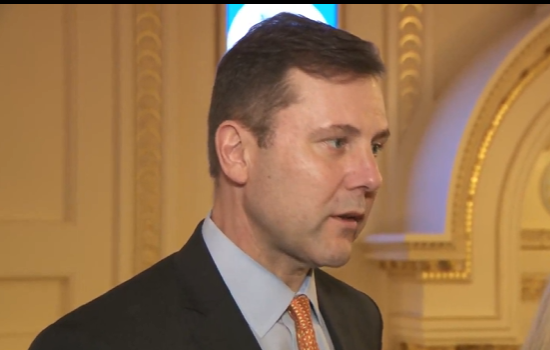Senate Republicans Call for Formation of Senate Select Committee on the Executive Branch’s Response to the COVID-19 Pandemic

Senate Republicans Call for Formation of Senate Select Committee on the Executive Branch’s Response to the COVID-19 Pandemic
The fifteen members of the Senate Republican caucus sent the following letter (click here for PDF) to Senate President Steve Sweeney calling for the formation of a Senate Select Committee on the Executive Branch’s Response to the COVID-19 Pandemic.
The full text of the letter is below:
May 13, 2020
Dear Senate President Sweeney,
We know you share our concern for the health and welfare of the nearly nine million New Jerseyans who have been impacted by COVID-19. More than 140,000 people in our state have been sickened by this disease, and more than 9,700 lives have been lost. The human tragedy that has been inflicted on our families and communities across the Garden State over the past two months has been almost unimaginable.
Unfortunately, however, we must acknowledge that the harm caused by the initial threat of the coronavirus may have been amplified by the response of the executive branch of our State government in certain cases, resulting in unnecessary physical and economic harm to New Jerseyans.
Therefore, we believe it is critically important that the New Jersey Senate constitute an investigative body to study the administration’s response to this crisis and to improve the State’s preparedness for the future. Included below for your review are several important concerns that we believe should be among those examined in detail by a proposed Senate Select Committee on the Executive Branch’s Response to the COVID-19 Pandemic.
First, we must try to understand why the administration failed to heed warnings and use common sense to protect our long-term care facilities (LTCs), which include nursing and veterans homes. Nursing homes and their staff warned that most LTCs didn’t have the protective equipment needed to care for sick residents. It’s unfathomable that the administration would prevent patients entering LTCs from being tested at the same time the governor was calling for broad statewide testing. Even worse, nursing homes were forced to accept patients who were known to have tested positive for COVID-19. This policy turned out to be a recipe for disaster. Once sick patients were admitted into the confines of these facilities, infection spread quickly. To date, nearly half of New Jersey’s COVID-19 fatalities occurred among the vulnerable populations of our LTCs. It’s imperative that we understand why the administration forced this disastrous approach.
Similarly, we warned that inmates, corrections officers, and communities then untouched by the coronavirus were put at unnecessary risk due to continued transfers from prison facilities in areas with high infection rates long after it was safe to do so. As a result of the administration’s failure to listen to repeated concerns, many of which came internally from NJDOC employees, COVID-19 was allowed to spread to inmates, officers, and host communities that could have been protected. We now know that a number of inmates and dedicated Corrections Officers have died due to COVID-19 infections that may have been preventable. We must try to understand what purpose the administration believes was served by moving inmates from “hot zone” prisons in North Jersey to communities further south that had remained infection free.
Further, the massive, ongoing failure at the Department of Labor to process unemployment insurance claims in a timely fashion has led to massive backlogs and extreme financial hardship for hundreds of thousands of New Jerseyans who have not received the benefits they are owed. When workers pay the UI Fund tax with every paycheck, they expect that benefit to be there in their time of need. Sadly, however, too many out-of-work New Jerseyans were let down when the State, under the governor’s leadership, failed to live up to its side of the bargain. We must examine why the administration spent weeks refusing to take action to add a sufficient number of claims processors, including its continued opposition to a proposal to reassign idle State workers to where they are needed. Fixes that should have been employed two weeks into the crisis still haven’t been adopted nearly two months later. We must understand the disconnect between the administration’s perception that it is doing a good job on this front and the vastly different reality every legislator is hearing from constituents in all corners of the state.
Finally, as New Jerseyans look to the governor to lift his restrictive orders and to allow for the reopening of our beloved state in a manner that is both safe and sustainable, it is clear that the Legislature must provide steady oversight. Additionally, we must be prepared for the eventuality that this crisis could be repeated again. It’s imperative that we learn from prior experience to improve our response tomorrow.
We believe the Select Committee we have proposed would improve transparency and accountability and provide important oversight of an administration that has preferred to govern by executive order. We hope you will agree this is in the best interest of New Jersey.
Sincerely,
Thomas Kean
Leader
Joe Pennacchio
Whip
Kristin Corrado
Conference Leader
Kip Bateman
Deputy Whip
Robert Singer
Deputy Leader
Chris Brown
Deputy Conference Leader
Steven Oroho
Budget Officer
Anthony M. Bucco
Senator – District 25
Gerald Cardinale
Senator – District 39
Christopher Connors
Senator – District 9
Michael Doherty
Senator – District 23
James Holzapfel
Senator – District 10
Declan O’Scanlon
Senator – District 13
Michael Testa
Senator – District 1
Samuel Thompson
Senator – District 12









